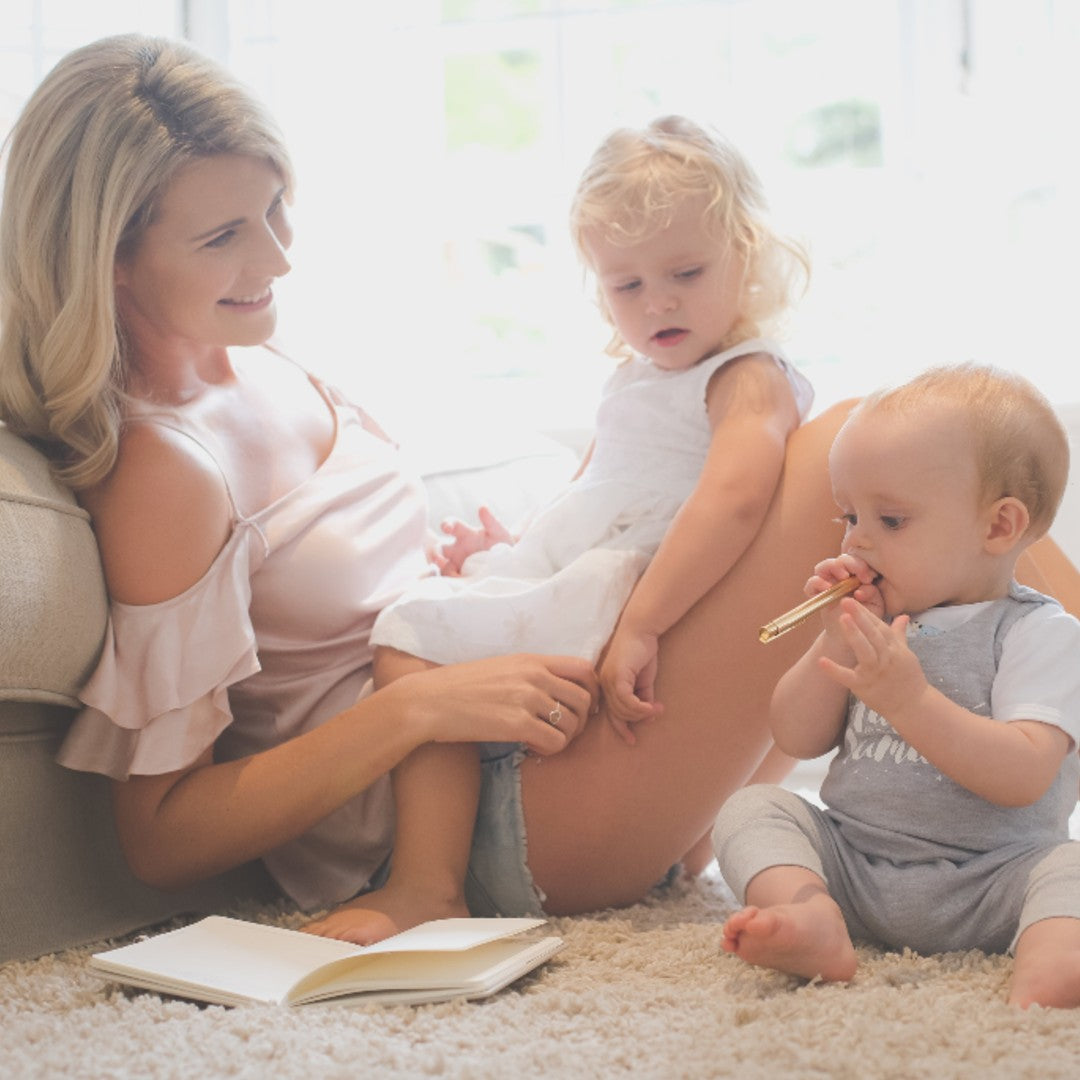Your Cart is Empty
Buy Now

Something had to give for me to smile again (Postpartum depression uncovered)
August 26, 2019 4 min read

- by Caitlyn de Beer (Self Management Coach & Speaker/ Psychology Lecturer)I’m a positive person by nature – I’m a go-getter and naturally optimistic; gracious a mum at a kids’ party once came up to me and said “Aren’t you that happy person?”. In context she was referring more to my brand than me, but you get the gist.
With a background in Psychology, I entered motherhood feeling relatively prepared, more so on the psyche front than the actual mommying side of things. My first child was born in 2016 and whilst I sobbed much of the first week home from hospital with a somewhat difficult baby, the tears eventually past. Fast-forward 17 months and my son (2nd born) was born in 2017. All was going well at first, I had 4month old and 20month old, had had a killer year at work and entered the holidays as an excited, distracted and very tired mum of 2. It took 2 weeks of holidaying before the wheels fell off. Christmas Day is usually my favourite day of the year. I’m a sucker for tradition and so the fact that I now have kids who can wake up to full sacks had me giddy with excitement in the months leading up to Christmas. I had bought them sacks with their names on them. I had wrapped their gifts at home before our trip to CT. It was going to perfect.
Except it wasn’t.
I’d been up all night with Noah, and lay awake from 3am sobbing. Christmas morning came and went and I stayed in bed with tears rolling down my cheeks. I was simply too tired to care. My mum managed to get hold of a tranquilizer of sorts to try and get me up and about and I managed to join in on Christmas lunch (40 excited humans) but I left straight after I’d eaten, blaming the kids and their upcoming nap times. When I look back to that holiday now, I feel my chest tighten up. I got home from that holiday (with glandular fever) and quickly found myself resenting my precious baby, who I adored but simply didn’t have the energy to pour in to. It was me at my worst and I am so grateful that I sought help as quickly as I did, when I realized that this was in fact a later onset of postpartum depression.Postpartum depression (PPD) shows itself in different forms for different mums. Some mums can’t stop crying, some are crippled with anxiety, and others can’t sleep whilst others too want to sleep all day. Many mums struggling with PPD have a hard time connecting with their baby too, which of course merely adds to their mommy guilt and anxiety.
What’s important to note here is that you don’t have to have a history of depression to get postpartum depression.
PPD can be caused by a few interrelating factors:
- Physical: A drop in hormones (estrogen & progesterone) can cause a postpartum mum to experience sluggishness and depression
- Emotional: Anxiety, frustration and a lack of sleep can too be a cause of PPD
I want to mention at this point that ‘baby blues’ are different to PPD; crying is normal, as is anxiety in motherhood, but when it lasts for longer than a few weeks and feels all consuming – its probably time to see a professional.
A quick re-mention of some signs of PPD:
- Excessive crying
- Withdrawing from family/friends
- Reduced interest in previously pleasurable activities/hobbies
- Lack of motivation to get out of bed
- Disconnect between mum and baby
- Loss of appetite
- Sever mood swings/ Anger
- Sleeplessness
I know many of us, as mums, see our mummy responsibility not as privilege but a deeply innate duty. In saying this, responsibility is a beautiful value to hold in high esteem, but there comes a point where some mums are willing to sacrifice their own sanity for responsibly. And it is at this point that I want to remind you, Beautiful, that asking for help is not weakness. In fact it is far from that – admitting PPD and getting diagnosed and onto medication or a home treatment plan as quickly as possible, will have a beautiful long-term affect on you, your baby and your other relationships.
Looking after you is key to looking after your baby; and remember that PPD can show up as late as a year after birth so don’t rule it out if you’re genuinely not coping and baby is a bit older.
Looking back now as my son is about to turn 2, I am so grateful for putting strategies in place to get me through the hardness of PPD and now being able to remember that season with compassion and joy, rather than regret.
Who to see if you feel you need help:
- A Psychologist
- A GP (preferable a female one)
For those mums who read this and thought ‘I don’t think it's PPD but gracious I miss the old me”, then click the link below to find out about my online Mums Living their BEST Life Course. It’s a 5 week online course designed to provide you with tools to love your life right now, even in the hardness that is motherhood.
Www.caitlyndebeer.com/mumscourse/
Discount code of 20% OFF: mrsmilk
Subscribe
Sign up to get the latest on sales, new releases and more …









